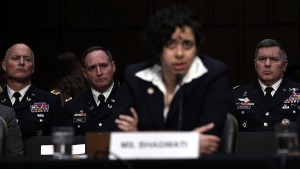Many other countries have similar systems, according to a statement from the senators.
Speier has made sexual assaults a focus since she was in the California Legislature.
"I came to Congress and I was frankly astounded at how antiquated the military justice system is," she said.
"Right now you've got a commander with no legal expertise, who often times is conflicted because they know the perpetrator, are friends with the perpetrator, may themselves be the perpetrator," she said.
"Or they are looking for promotion and they don't want this black stain on their records that sexual assaults are somehow going on in their units."
Sometimes officers accuse victims of having a personality disorder and discharge them from the military, she said. As a result, Speier said, victims are afraid to report crimes.
According to a Department of Defense report released last week, out of an estimated 26,000 cases of sexual assault last year, only 3,374 were reported, and of these, just 302 resulted in prosecutions, with 238 convictions.
"That's historically been the problem," said Speier. "These have been swept under the rug and given what's called nonjudicial punishment — a couple of days of hard labor when you're dealing with a violent felony that in civilian society would put you behind bars for three to five years."
So why hasn't Congress stepped in before now?
Speier said her colleagues on the House Armed Services Committee haven't even given her bill a hearing.
"The military doesn't want this and the committee tends to be very deferential to what the military wants," she said. "This is one of those issues where what the military wants is not good enough for all the men and women in the military who want to serve without being jumped by a sexual predator in the night."
But the committee chair, Buck McKeon, a Republican from Santa Clarita, said he, too, is very concerned about sexual assault in the armed forces.
"The chairman said as recently as this week that his confidence in senior military commanders effecting the kind of cultural changes needed on this issue has been deeply shaken," said his spokesman, Claude Chafin.
Chafin said the National Defense Authorization Act will include language dealing with the problem of sexual assault. But he wasn't sure that would include taking the responsibility for prosecution away from officers in the chain of command.
Instead he pointed to a couple of other bills that he thought would be incorporated in the bill that passes the committee.
A bill by Jackie Walorski, an Indiana Republican, and Loretta Sanchez, a Democrat from Orange County, would provide whistle-blower protections to people who report sexual assaults.
And a bill by Mike Turner, D-Ohio, and Niki Tsongas, D-Mass., would prevent officers from overturning convictions. Speier has separately introduced a bill aimed at the same goal, and the Senate bill has similar language.
But Chafin pointed out that anyone on the Armed Services Committee will have a chance to offer amendments during the markup of the bill — the procedure by which the text is written. Markup for the NDAA will begin next week in subcommittees and is scheduled to go to the floor of the House in mid-June, he said.
In the meantime, Speier is trying something else to get momentum for her position: online petitions. Her campaign office initiated one on Courage Campaign, a website of California progressives. The petition has been picked up by MoveOn.org and other sites.
"I think this issue is gaining gravitas," Speier said.
